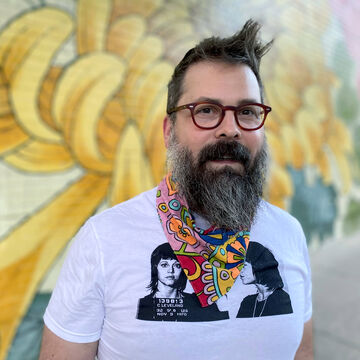

Mark Addison Smith
Associate Professor
Contact
Personal Statement
Mark Addison Smith (he/him) is a queer artist whose design specialization is typographic storytelling: allowing illustrative text to convey a visual narrative through printed matter, artist's books, and site installations. With his on-going, text-based archive, "You Look Like The Right Type," he has been illustrating snippets of overheard conversations every single day since 2008 and exhibiting the works as larger-scale conversations between strangers exchanging words on topics never spoken. "You Look Like the Right Type" has been featured in Deadline, Design Sponge, Goodtype, Hyperallergic, I Love Typography, PRINT Magazine’s The Daily Heller, Queerty, MAGMA Brand Design’s Slanted Magazine, and the first episode of NYCxDESIGN’s podcast, The Mic.
Bio
Education: MFA, 2008, School of the Art Institute of Chicago (Visual Communication Design); BFA, 1999, Georgia State University (Film and Video). Collections: Artexte, Art Gallery of Ontario, Brooklyn Museum Artists’ Books Collection, Center for Book Arts, Cleveland Institute of Art Gund Memorial Library, Cooper Hewitt Smithsonian Design Museum, Design Museum of Chicago, Gerber/Hart Library and Archives, Getty Research Institute, Glasgow School of Art Special Collections, Guggenheim Museum Library and Archives, Joan Flasch Artists’ Book Collection at the School of the Art Institute of Chicago (SAIC), Kansas City Art Institute (KCAI) Artists’ Books Collection, Kinsey Institute, Leslie-Lohman Museum of Art, Library of Congress Rare Books and Special Collections, Los Angeles County Museum of Art (LACMA) Research Library, The Metropolitan Museum of Art Watson Library, Minnesota Center for Book Arts (MCBA), MoMA Franklin Furnace, Museum of Contemporary Art (MCA) Chicago, ONE National Gay and Lesbian Archives at the University of Southern California (USC), Princeton Firestone Library Graphic Arts Collection, Rhode Island School of Design (RISD) Fleet Library Special Collections, Smithsonian American Art and National Portrait Gallery Library Artists’ Book Collection, Tate Library and Archives, University of California Los Angeles (UCLA) Arts Library, University of Dundee Museum Collections (abcD), V&A Museum National Art Library, Walker Art Center Archives and Library, Whitney Museum of American Art Library Special Collections, Yale Arts Library Special Collections. Exhibitions: Solo: The Bakery Atlanta (co-presentation with Eyedrum), Center on Halsted (Chicago’s LGBTQIA+ Community Center), McMaster Gallery (School of Visual Art and Design at the University of South Carolina), Valade Family Gallery (College for Creative Studies, CCS); Group: Center for Book Arts, Kinsey Institute, Leslie-Lohman Museum of Art, Minnesota Center for Book Arts (MCBA). Publications: Book chapters: Diversity and Design: Understanding Hidden Consequences (Routledge), Queering Translation, Translating the Queer (Routledge); Featured artwork: The Blue Notebook (Centre For Print Research, University of the West of England), Design School Confidential (Rockport), Queer Holdings: A Survey of the Leslie-Lohman Museum Collection (Hirmer Publishing), What Really Makes America Great (Andrews McMeel Publishing). Awards: Design Incubation Communication Design Educators Award (Scholarship: Creative Production), Penland School of Craft Residency, Research Foundation of The City University of New York (RFCUNY)